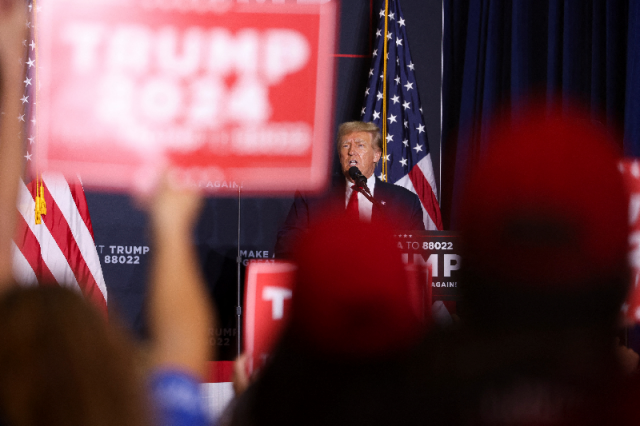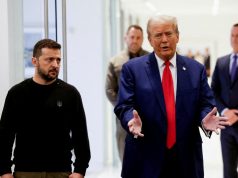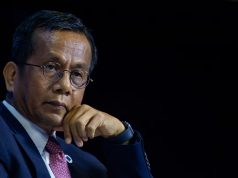
Former U.S. President Donald Trump said on Wednesday that if elected again he would shift resources from federal law enforcement agencies and send thousands of overseas-based troops to the U.S.-Mexico border.
Speaking to supporters in Iowa, where the Republican Party’s first nominating contest for the November 2024 election will be held in January, Trump also promised to expand on a travel ban that barred people from several countries with majority Muslim populations during his 2017-2021 presidency.
Calling record illegal U.S.-Mexico border crossings under President Joe Biden an “invasion,” Trump sought to place blame for the problem on the current administration. Biden, a Democrat, is running for re-election and could have a rematch election against the Republican front-runner Trump.
“Upon my inauguration I will immediately terminate every open borders policy of the Biden administration,” Trump said at a rally in Dubuque. “I’ll make clear that we must use any and all resources needed to stop the invasion, including moving thousands of troops currently stationed overseas.”
Trump provided few specifics, including on exactly how he planned to expand on any ban imposed on Muslim-majority countries. It was unclear if Trump would face any legal hurdles to implementing such measures.
The Biden administration has defended its border policies, saying it is using the tools available, while calling on Congress to pass laws to fix a broken system. Most people seeking to cross the southern U.S. border come from Central American countries.
Trump‘s rivals have stepped up their rhetoric on immigration in recent weeks, promising tough action on crossings at the U.S.-Mexico border in a sign of the importance of the issue to Republican primary voters.
About one in six Republicans consider immigration as the most pressing issue facing the country, making it the third most important issue to them after the economy and crime, a Reuters/Ipsos poll this month showed.
Last week, Florida Governor Ron DeSantis said in an interview with CBS’s Norah O’Donnell that if elected president he would send the military to the border and authorize the use of deadly force against members of drug cartels.
DeSantis is Trump‘s top rival but remains some 40 percentage points behind him in opinion polls.
The Dubuque rally was one of two afternoon stops for Trump in Iowa on Wednesday. His campaign is scheduling a series of visits to the state in the coming weeks, as he seeks to fend off a push there by his primary rivals, some of whom have spent considerably more time and money in Iowa.
Trump was the only major candidate to skip the annual Faith and Freedom Coalition banquet in Des Moines over the weekend, missing a chance to connect with evangelicals, a critical voting bloc in the state.
His visit on Wednesday came as he confronted fresh criticism from conservatives for his stance on abortion, triggered by his Sunday appearance on NBC’s “Meet the Press,” in which he declined to commit to national restrictions on the procedure and called DeSantis’ signing of a six-week ban a “terrible mistake.”
Iowa Governor Kim Reynolds, who is popular in her state, and DeSantis were among the Republicans to blast Trump‘s remarks.
Trump told the crowd in Dubuque that they needed to “follow their heart” on abortion but warned that Republicans needed to “learn how to talk” about legislation in a way that doesn’t turn off voters. He said it was important to carve out exceptions for any ban for instances of rape, incest and the mother’s life.
“Without the exceptions, it is very difficult to win elections. We would probably lose the majorities in 2024 without the exceptions and perhaps the presidency itself,” he said.
– reporting by Nathan Layne in Wilton, Connecticut and Ted Hesson in Washington; Editing by Colleen Jenkins, Grant McCool and Michael Perry









